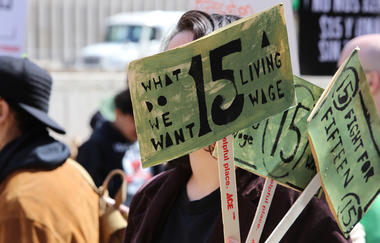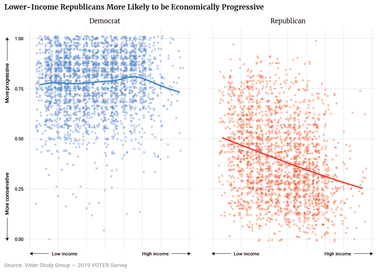Economy, Political Parties, Socio-Economic

With four rounds of televised debates behind us and February’s Iowa Caucuses drawing ever closer, the Democratic primary has begun in earnest, and progressive ideas are driving much of the policy conversation. Joe Biden, Bernie Sanders, and Elizabeth Warren have emerged as frontrunners backing different economic agendas, which elevates a familiar and increasingly urgent intra-party debate: Do voters want a progressive economic agenda? Or are voters more interested in moderate policies, that would win broader support from independents and Republicans?
Our analysis of data from the 2019 VOTER Survey (Views of the Electorate Research Survey) suggests that when it comes to voter preferences on economic policy, an intra-party debate might miss the point. Why? A progressive economic agenda is broadly popular across parties. This is the key takeaway from our Democracy Fund Voter Study Group Report, On the Money: How Americans’ economic views define — and defy — party lines.
The progressive policies with widespread support across parties include requiring employers to provide paid leave for parents and caretakers (64 percent support, 15 percent oppose); raising the minimum wage (61 percent support, 25 percent oppose); and raising taxes on families with incomes over $200,000 (59 percent support, 30 percent oppose).
Democratic voters’ support for these policies is consistently around 80 percent, regardless of income. In fact, Democrats making over $80,000 want to increase taxes on top-income earners even more so than those making under $40,000.
Perhaps more remarkable, we see that about one in five Republicans hold attitudes toward economic policy that more closely align with those of the average Democrat than Republican. These voters are roughly two-thirds women, predominantly lower-income, and people who want to maintain Social Security and Medicare. For example, lower-income Republicans are between 15 and 20 percentage points more likely to support policies such as higher minimum wage and mandatory paid family leave than their higher-income party members. Forty-five percent of Republicans making under $40,000 a year want to increase taxes on wealthy households, compared to 23 percent of Republicans making over $80,000 who say the same.

To be sure, public opinion is one thing and voting is another. There are other forces at work on election day behaviors.
Partisanship, in particular, can override personal policy views. While independents who prefer progressive economic policies have moved in a more Democratic direction since 2016, only 9 percent of Republicans who report these views say they plan to vote for a Democrat, and 19 percent say they are undecided.
What drives party affinity — or dissonance — can run deep. Voter Study Group research found that voters hold competing narratives about how the economy functions, and for whom. Democrats generally attribute economic inequality to systemic unfairness and institutional bias. They tend to believe that the poor are poor because of discrimination and an unjust system, and that wealthy are wealthy because they did not play by the rules. Few Republicans agree, instead ascribing wealth to talent and hard work. Republicans also see the wealthy as having a generally positive impact on society — for example, through creating jobs, practicing philanthropy, and spurring innovation. Democrats tend to focus on the ways in which wealthy people can take advantage of others and exploit influence.
Here we find yet another consensus view that cuts across party lines: In our survey, “political influence” was a rare source of agreement among Democrats and Republicans — 90 percent of Democrats and 72 percent of Republicans agreed that wealthy people have too much influence on politics.
Voter Study Group data suggest progressive economic policies are supported by most Democrats, many independents, and even some Republicans. Yes, partisanship is a powerful force in the electorate, but elections are won at the margins. If fewer than 80,000 votes decided 2016 and 537 in 2000, the number of voters swayed by these common ground economic issues could prove decisive.
Lee Drutman, Vanessa Williamson, and Felicia Wong are members of Voter Study Group. Views expressed here are their own and do not necessarily reflect those of the collective Voter Study Group. Read their full report On the Money and take a look at all Voter Study Group publications.
Subscribe to our mailing list for updates on new reports, survey data releases, and other upcoming events.